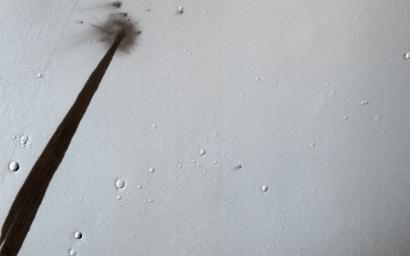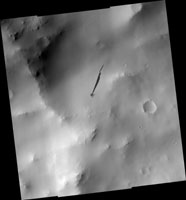
|
Bang and Whoosh!
- Click the image above for a larger view
- Full-Res JPEG (2880 x 1800) (960.3 kB)
- Full-Res TIFF (2880 x 1800) (14.7 MB)
Caption:

Map Projected Browse Image
Click on image for larger version
This HiRISE image from NASA's Mars Reconnaissance Orbiter (MRO) captures a new, dated (within about a decade) impact crater that triggered a slope streak . When the meteoroid hit the surface and exploded to make the crater, it also destabilized the slope and initiated this avalanche.
The crater itself is only 5 meters across , but the streak it started is 1 kilometer long! Slope streaks are created when dry dust avalanches leave behind dark swaths on dusty Martian hills. The faded scar of an old avalanche is also visible to the side of the new dark streak.
The map is projected above at a scale of 25 centimeters (9.8 inches) per pixel. [The original image scale is 27.7 centimeters (10.9 inches) per pixel (with 1 x 1 binning); objects on the order of 55.4 centimeters (21.8 inches) per pixel (with 2 x 2 binning) across are resolved.] North is up.
Background Info:
The University of Arizona, Tucson, operates HiRISE, which was built by Ball Aerospace & Technologies Corp., Boulder, Colorado. NASA's Jet Propulsion Laboratory, a division of Caltech in Pasadena, California, manages the Mars Reconnaissance Orbiter Project for NASA's Science Mission Directorate, Washington.
Cataloging Keywords:
| Name | Value | Additional Values |
|---|---|---|
| Target | Mars | |
| System | ||
| Target Type | Planet | |
| Mission | Mars Reconnaissance Orbiter (MRO) | |
| Instrument Host | Mars Reconnaissance Orbiter | |
| Host Type | Orbiter | |
| Instrument | High Resolution Imaging Science Experiment (HiRISE) | |
| Detector | ||
| Extra Keywords | Color, Crater, Dust, Impact, Map | |
| Acquisition Date | ||
| Release Date | 2018-06-11 | |
| Date in Caption | ||
| Image Credit | NASA/JPL-Caltech/Univ. of Arizona | |
| Source | photojournal.jpl.nasa.gov/catalog/PIA22513 | |
| Identifier | PIA22513 | |
